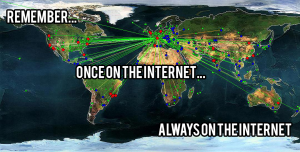Do you remember the One with the Thumb? Or the One with the Dozen Lasagnas? Where would we be without the TV show Friends?
Friends was the staple TV diet of millions of fans for 10 years and many were grieved to see its final episode on May 6th in 2004. But Friends is still a huge household name and continues to have a massive fan base worldwide.
While there isn’t an episode where our six on-screen compadres jump out of the screen and take us to court like this blog title suggests, if you are a Friends fan and have downloaded an episode from one of your favourite files sharing sites, then a lawsuit is exactly what could happen to you. As Chandler’s dating mistake, Janice, would say, “Oh. My. GOD!”
I neither condone or promote the unlawful sharing of anything.
File sharing is an individual’s choice and everyone has their own opinion on it. Warner Brothers, the driving force behind the Friends franchise, creator of Bugs Bunny, and subsidiary of Time Warner Entertainment, (which made a net profit of – wait for it – $3.69 billion in 2013), has a lot to say about it. Namely, they’re not huge fans of Friends fans sharing Warner Bros. property and they’re taking extreme measures to be compensated by anyone who takes what’s theirs.
Sharing isn’t a big deal, is it?
Actually, it is. Recently, file sharers in the states have been hit with settlement notices from the copyright enforcement company, RightsCorp, who is working on behalf of Warner Bros. According to reports, these settlements have been raised in relation to the unlawful sharing of a single Friends episode. The fee to make the possibility of court action vanish is $30. Compared to other settlement amounts published in the past, this isn’t a very big deal.
And yet, while $30 might not sound like a lot, for many people, it is and it can certainly add up. Plus, you also have to take into account that people “sharing” this content can, more often than not, fall into the following categories:
- They already have the episode on another medium (VHS, DVD, etc) and they are looking for a more convenient way to watch the content they already own
- They’ve already seen the episode on TV. Their TV subscription, along with revenues from advertising, could justify the cost of downloading in their minds
- It is far easier to download the episode from file sharing sites than it is to obtain it from archaic, multi-step, and restricted authorised sources
Is fining core fans really the way to go?
I understand that Warner Bros. is more than entitled to protect their content, but is fining their core fans really the way to go?
Warner Bros. has to realise that penalising their main consumers will damage their reputation . Those who are penalised will quickly resent Warner Bros. and, more than likely, never purchase or promote anything that is produced or distributed by them again. This attitude could spread to their fans’ friends, family and then, like what has happened in this case, to all corners of the internet.
And, as we all know, once it’s on the internet: There is No. Stopping it.
Possible solutions to the “problem?”
Almost every company that has a digital product has experienced some form of unlawful file sharing in one form or other (even our company, LiveCode, has). What can these companies do to rectify future situations like the Warner Bros. predicament and keep consumers in their good books?
- Create a more cost effective way to purchase from legitimate sources: Using Friends as an example, purchasing an episode costs £1.89 on the Google play store. There are 236 episodes so if you were to purchase each of these individually, it would come to an astronomical £446.04. There is also the option of £15.49 per season, but this still comes to a rather high £154.90.
- Make your content part of a subscription service: This is where I can give Warner Bros. their dues. They recently put Friends on Netflix, so you can access all episodes of Friends as long as you keep up your $8.99/month subscription. With that being said, a current major drawback of this is that you have to be an American resident to access Friends on Netflix because the Friends catalog is not available on Netflix in other countries.
- Create a custom subscription service: Netflix has 30 million subscribers, which equates to around $261,000,000 generated per month. If a company was able to subscribe even 10% of that user base at half the cost, they would still be bringing in a healthy $15,000,000 per month!
- Release all content for “free”: This content can be monetized with ads, so even though the content is free, you will still indirectly earn revenue.
These suggestions aren’t going to make unlawful file sharing disappear over night. There will always be a majority of users out there who will file share anything (and everything) they can get their hands on.
But to close in a potentially positive light, many forums and blogs like to reiterate: “If your product is on a file sharing site…then you’ve made it.”
What do you think? Is file sharing okay? Should companies use settlements to battle piracy? What would you do?






3 comments
Join the conversationRoger Eller - June 26, 2015
I like the Netflix option. The convenience to watch whenever you wish, and to not be bothered with ads makes the subscription a good value. I don’t understand why they restrict content by country though.
Seth Morrow - June 26, 2015
I think the people who are doing the most to combat piracy are companies like Netflix, Hulu, Amazon prime, and the plethora of paid music streaming services available these days. The more convenient it is for users to purchase content, the less likely they are to pirate it. That being said, there is a certain percentage of people who will continue to pirate everything just because they can, but I believe they are in the minority. I think the issue is a bit more complex when it comes to software. I understand a lot of folks would like to “try before they buy”, but I am skeptical that once a user has a pirated version of some software that is fully functional, that they would then decide to actually purchase the software and install it again, but I could be wrong on that one. In any case, I think the real solution to this problem is to continue to give users more and easier ways to legally purchase content and they will. From what I understand traffic on the BitTorrent network has gone down significantly since the companies I named above have risen to prominence. I don’t think that lawsuits going after individual users are proper or effective, making it more convenient to find and purchase legal content is the way to go.
LiveCode - June 26, 2015
The One Where We Sued You: A debate on file sharing and piracy: http://t.co/SzsarBmfML